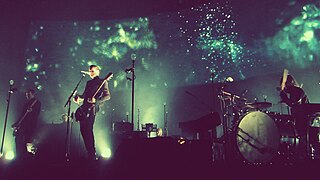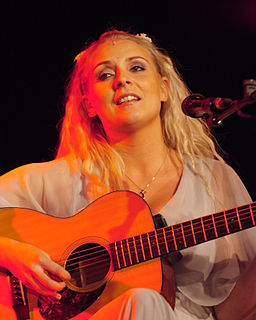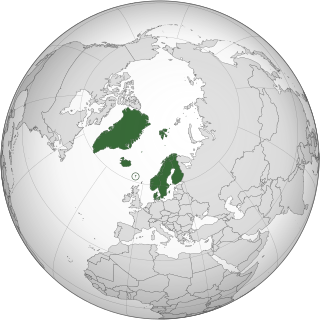This page indexes the individual year in Icelandic music pages. Each year is annotated with a significant event as a reference point.
This page indexes the individual year in Icelandic music pages. Each year is annotated with a significant event as a reference point.

Iceland is a Nordic island country in the North Atlantic Ocean and the most sparsely populated country in Europe. Iceland's capital and largest city is Reykjavík, which is home to over 65% of the population. Iceland is the only part of the Mid-Atlantic Ridge that rises above sea level, and its central volcanic plateau is erupting almost constantly. The interior consists of a plateau characterised by sand and lava fields, mountains, and glaciers, and many glacial rivers flow to the sea through the lowlands. Iceland is warmed by the Gulf Stream and has a temperate climate, despite a high latitude just outside the Arctic Circle. Its high latitude and marine influence keep summers chilly, and most of its islands have a polar climate.

Reykjavík is the capital and largest city of Iceland. It is located in southwestern Iceland, on the southern shore of Faxaflói bay. Its latitude is 64°08' N, making it the world's northernmost capital of a sovereign state. With a population of around 131,136, it is the centre of Iceland's cultural, economic and governmental activity, and is a popular tourist destination.

The Nordic Council is the official body for formal inter-parliamentary Nordic cooperation among the Nordic countries. Formed in 1952, it has 87 representatives from Denmark, Finland, Iceland, Norway, and Sweden as well as from the autonomous areas of the Faroe Islands, Greenland, and Åland. The representatives are members of parliament in their respective countries or areas and are elected by those parliaments. The Council holds ordinary sessions each year in October/November and usually one extra session per year with a specific theme. The council's official languages are Danish, Finnish, Icelandic, Norwegian, and Swedish, though it uses only the mutually intelligible Scandinavian languages—Danish, Norwegian, and Swedish—as its working languages. These three comprise the first language of around 80% of the region's population and are learned as a second or foreign language by the remaining 20%.

Sigur Rós is an Icelandic post-rock band from Reykjavík, active since 1994. The band comprises singer and guitarist Jón Þór "Jónsi" Birgisson, bassist Georg Holm and keyboardist Kjartan Sveinsson. Known for their ethereal sound, frontman Jónsi's falsetto vocals, and their use of bowed guitar, Sigur Rós incorporate classical and minimal aesthetic elements.
The music of Iceland includes vibrant folk and pop traditions, as well as an active classical and contemporary music scene. Well-known artists from Iceland include medieval music group Voces Thules, alternative rock band The Sugarcubes, singers Björk, Hafdís Huld and Emiliana Torrini, post-rock band Sigur Rós, post-metal band Sólstafir, indie folk/indie pop band Of Monsters and Men, blues/rock band Kaleo, metal band Skálmöld and techno-industrial band Hatari. Iceland's traditional music is related to Nordic music forms. Although Iceland has a very small population, it is home to many famous and praised bands and musicians.

Eivør Pálsdóttir, known mononymously as Eivør, is a Faroese singer-songwriter and actress. Born and raised in Syðrugøta, she had her first televised performance at the age of 13. Over the course of her decades-long career, her musical output has spanned a wide range of genres such as folk, art pop, jazz, folk rock, classical and electronica.
Tappi Tíkarrass was an Icelandic punk band which added elements of funk, rock and jazz to their music, marking a difference from other traditional bands at that time. The band is also considered the first serious music project of now renowned singer Björk Guðmundsdóttir. The band was reformed in 2015 by the original members, without Björk.

The Nordic Council Music Prize is awarded annually by NOMUS, the Nordic Music Committee. Every two years it is awarded for a work by a living composer. In the intervening years it is awarded to a performing musician or ensemble.

Iceland is a world leader in renewable energy. 100% of Iceland's electricity grid is produced from renewable resources. In terms of total energy supply, 85% of the total primary energy supply in Iceland is derived from domestically produced renewable energy sources. Geothermal energy provided about 65% of primary energy in 2016, the share of hydropower was 20%, and the share of fossil fuels was 15%.

The Kingdom of Iceland was a sovereign and independent country with a constitutional and hereditary monarchy that was established by the Act of Union with Denmark signed on 1 December 1918. It lasted until 17 June 1944 when a national referendum established the Republic of Iceland in its place.

Björk Guðmundsdóttir is an Icelandic singer, songwriter, composer, record producer and actress. Over her four-decade career, she has developed an eclectic musical style that draws on influences and genres including electronic, pop, jazz, experimental, trip hop, alternative, classical, and avant-garde music.

The Nordic countries are a geographical and cultural region in Northern Europe and the North Atlantic. It includes the sovereign states of Denmark, Finland, Iceland, Norway and Sweden as well as the autonomous territories of the Faroe Islands and Greenland, and the autonomous region of Åland.
Arnthor Birgisson, is an Icelandic-Swedish songwriter and producer. Arnþór moved to Sweden in 1978 at age two, and lives in Stockholm.

Hjaltalín is an Icelandic indie rock band that has published four studio albums as of 2020. Their second record, Terminal, was chosen as the album of the year at the 2010 Icelandic Music Awards. They have also played throughout Europe, most notably at Roskilde and Latitude festivals (2009) and at Sziget Festival (2010).
Feldberg is an Icelandic musical duo formed by Eberg and Rósa Birgitta Ísfeld from Reykjavík. Their debut album, Don't Be a Stranger, was first released in Iceland in 2009 on Cod Music. At the Icelandic Music Awards (IMA) in 2010, they were nominated for three awards and won for Best Song for their track "Dreamin'", which was subsequently featured on the Kitsune Compilation 9. Their music has been extensively used for advertising in Iceland; the airline Icelandair use "Dreamin'" as their in-flight music choice. The new Feldberg album will be released in 2012 and the band have featured some of the new songs at their latest concerts in Tokyo supporting Casio Kids and Le Corps Mince De Francois.

Auður Ava Ólafsdóttir is an Icelandic professor of art history, a novelist, playwright and poet. She received the Nordic Council Literature Prize for Hotel Silence in 2018 and the Médicis Foreign Award for Miss Iceland in 2019.

Eyþór Ingi Gunnlaugsson, transliterated/also known as Eythor Ingi, is an Icelandic singer, songwriter, producer, actor, and musician, known for solo material bands called Eldberg, Todmobile and Rock Paper Sisters, represented Iceland in the Eurovision Song Contest 2013 in Malmö, Sweden with the song "Ég á líf" after winning Söngvakeppnin 2013.

Pollapönk are an Icelandic punk-inflected children's music band which represented Iceland in the Eurovision Song Contest 2014 in Copenhagen, Denmark, with their song "No Prejudice".